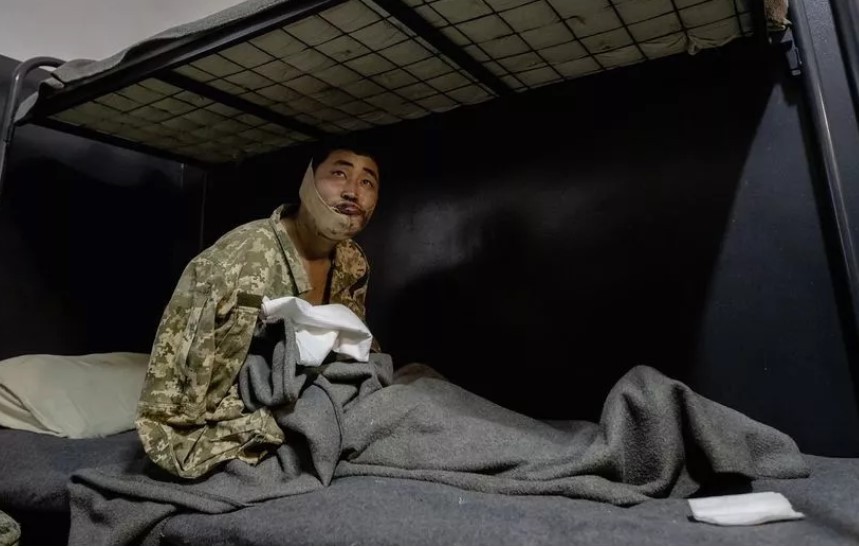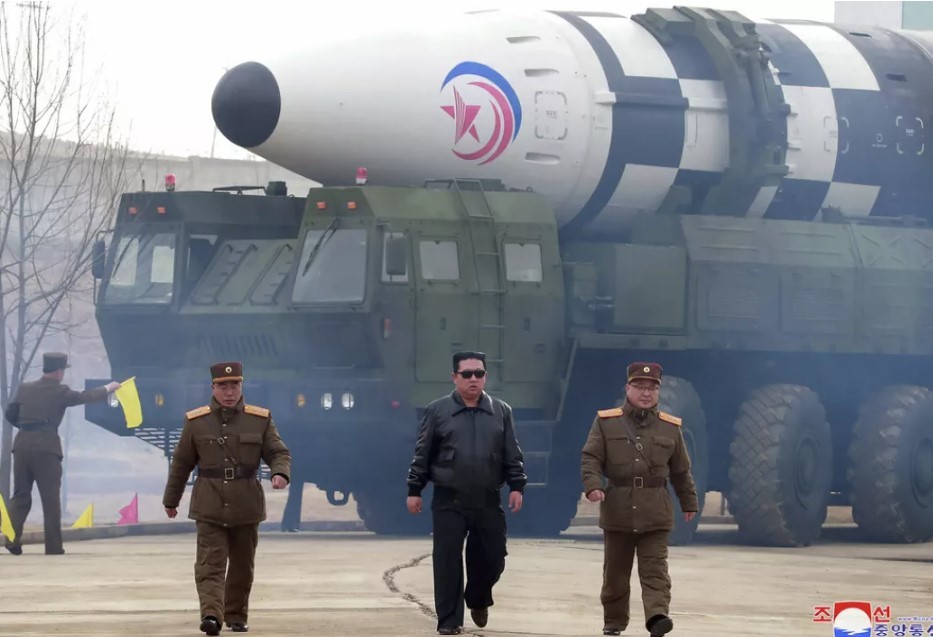Top 12 Most Popular Holidays and Festivals in North Korea
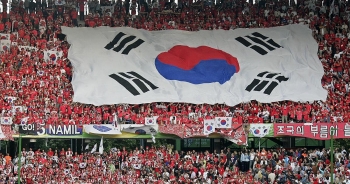 North Korean National Anthem: English Translation, Original Lyrics And History North Korean National Anthem: English Translation, Original Lyrics And History |
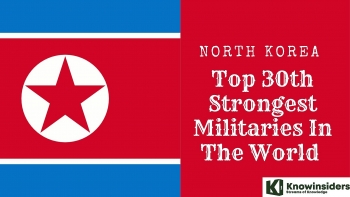 How Strong Is North Korean Army – The World's 30th Powerful Militaries How Strong Is North Korean Army – The World's 30th Powerful Militaries |
It is well known that North Korea enjoys a good holiday. They typically perform this several times a year. However, military parades are only held in conjunction with significant anniversaries (50th, 75th, etc.), which are celebrated annually. You can typically anticipate a mass dance, concert, community celebrations in parks, and a fireworks display for a non-anniversary event. What major holidays are celebrated in North Korea, and when should you visit to join them?
The Spring Dragon Boat Festival and the Mass Games, which take place from May through October, are the only two significant festivals in North Korea that are open to outsiders. The Great Leader Kim Il Sung and the Dear Leader Kim Jung-il both have other occasions and holidays to mark their birthdays.
1. Kim Il Sung Birthday - Day of the Sun
Location: Pyongyang
Date: April 15
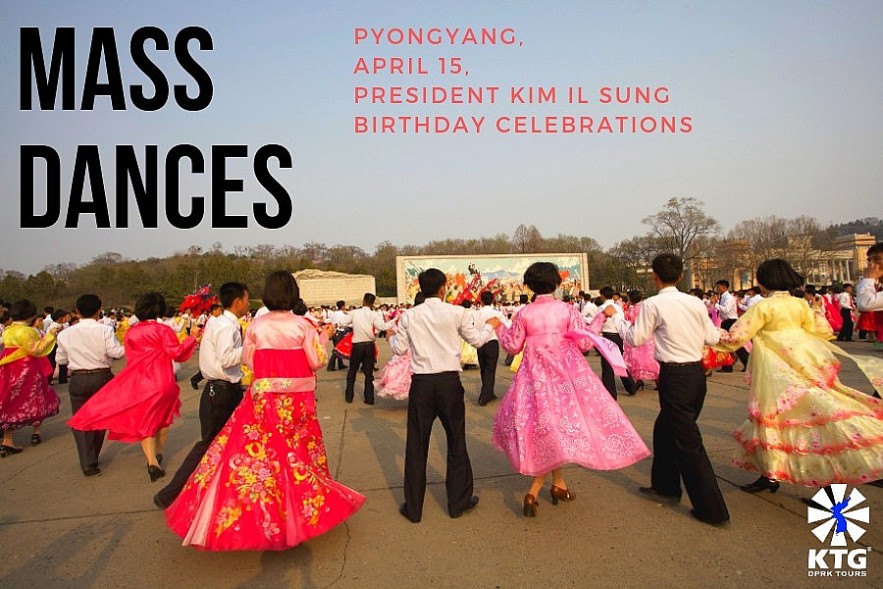 |
| Kim Il Sung Birthday Celebration |
On April 15, 1912, is thought to have been the date of birth of Kim Il Sung, the founding father of North Korea. 8 July 1994 saw his passing.
Kim Il Sung's birthday, also known as "Day of the Sun" in the DPRK, is the biggest and most well-known holiday in North Korea. The timing of this holiday is ideal because spring has arrived and residents are eager to leave their homes after a long winter.
The populace is granted two days off and is given additional rations of more upscale foods like meat and eggs. In essence, it is the holiday in North Korea.
People in North Korea start their days by paying respects to various monuments and statues throughout the city, as well as making trips to President Kim Il Sung's final resting place, Kumsusan Palace of the Sun, and his hometown of Mangyongdae. As the day goes on, people go to nearby parks and eateries to enjoy their free time with BBQ and music.
2. Kim Jong Il's Birthday, "Day of the shining star"
Date: February 16
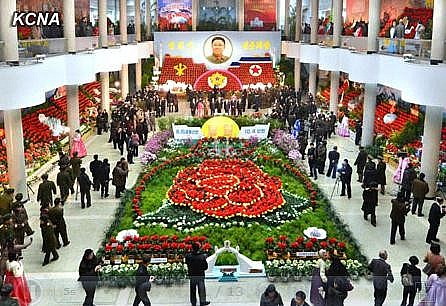 |
| 17th annual Kimjongilia festival |
It is believed that Kim Jong Il, the second leader of North Korea, was born on February 16, 1941. His father was the nation's first leader.
In North Korea, he instituted the "Songun" policy, which literally translates to "military first," and enacted changes that gave spending on the military a higher priority than spending on other domestic necessities.
He died in December 17, 2011.
3. Lunar New Year
Date: January 1
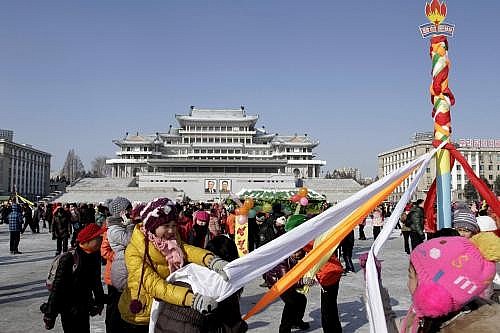 |
| North Korean girls play a traditional maypole ribbon dance at Pyongyang's Kim Il Sung Square to celebrate the Lunar New Year. (AP Photo/Jon Chol Jin) |
The first day of the Korean lunar calendar, known as "Seollal," is a holiday observed by both North and South Korea. It is arguable that this holiday is more significant than New Year's Day, which is observed on January 1.
Despite the fact that the holiday was ignored for a brief period of time during Kim Il Sung's rule, the practice was brought back in 1989. Although the country places a greater emphasis on national holidays, it does permit its citizens to participate in certain traditions, such as paying respects at the graves of ancestors.
4. Military Foundation Day
Date: April 25
In order to celebrate the anniversary of the founding of the Korean People's Army, North Korea has been holding military drills and parades.
Even though the national holiday is meant to be a day of rest, a large number of people are still required to attend events and rallies of a more official nature.
5. May Day
Date: May 1
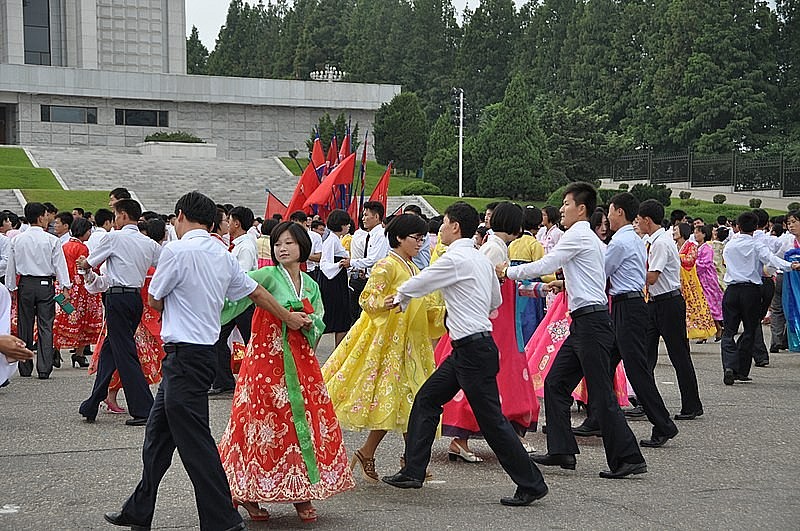 |
| May 1st – International workers day is marked throughout much of the world. It’s a big family friendly one in North Korea |
May Day, also known as International Workers Day or Labor Day, is a holiday celebrated in North Korea. The North Korean working class is honored with a national holiday on the day that coincides with the holiday. Along with other events, such as Liberation Day and Victory Day, it is one of the many public holidays that is celebrated in North Korea.
Because it is so closely aligned with the ideology of communism, May Day has traditionally been celebrated as a national holiday in a great number of socialist and communist countries. The commemoration of International Workers Day is not unique to North Korea; rather, it is a holiday that is observed in a large number of countries, among them the United States of America. 'Labor Day' is the name given to this holiday in the United States.
The celebrations of the holiday in North Korea frequently take place in the public parks throughout the country. The Mount Taesong (Taesongsan) Park, which is located to the north-west of Pyongyang, is by far the most visited attraction. In North Korea, the first of May is traditionally celebrated with a variety of festive activities, including drinking, dancing, and picnicking. Because of the typically pleasant weather in April and May, outdoor activities and celebrations during this holiday may even be more extravagant than those held to commemorate other national holidays.
6. Dragon Boat Festival
Location: Pyongyang
Date: June
The annual Dragon Boat Festival takes place in North Korea at the beginning of spring, which corresponds to the beginning of spring in China. Dragon boat races are just as popular in North Korea as they are in China. A stop at the major event that will be held in Pyongyang is one of the authorized tour activities.
The specific beginnings of the Dragon Boat Festival are unknown, but it is widely held that it has shamanistic roots and is somehow connected to the yearly cycle of agricultural production. However, the official records claim that it originated during the Chinese Cho Dynasty, when a faithful retainer by the name of Qu Yuan jumped into the Milo river to demonstrate his political loyalty. The end of the planting season, which occurs close to the summer solstice, is traditionally celebrated as a day to honor spiritual ethos and make wishes for a prosperous harvest. Additionally, the harvesting of winter wheat can now take place.
The annual Dragon Boat Festival takes place in North Korea at the beginning of spring, which corresponds to the beginning of spring in China. Dragon boat races are just as popular in North Korea as they are in China. A stop at the major event that will be held in Pyongyang is one of the authorized tour activities.
7. Victory Day
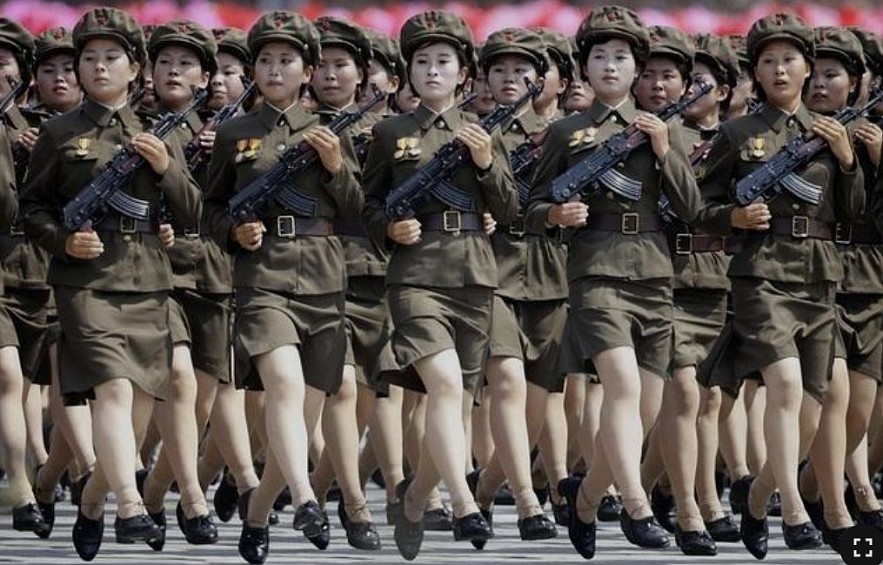 |
| Victory Day Parade in North Korea |
Date: July 27
This day is celebrated as a national holiday in North Korea to commemorate the signing of the armistice agreement that put an end to the three-year Korean War.
A public holiday is observed throughout North Korea on the Day of Victory in the Great Fatherland Liberation War. This day, which is also celebrated as Armistice Day, honors the signing of the armistice agreement on July 27, 1953, which brought an end to the fighting in the Korean War; however, the war itself did not end with the signing of the agreement.
The North Korean people are given the day off of work so that they can participate in the Victory Day celebrations. People in North Korea enjoy the warm weather by going to public parks and squares where they participate in mass dances, which are a well-known form of celebration activity in North Korea. The atmosphere is upbeat and everyone is in a good mood on Victory Day, making it a wonderful time to travel to North Korea. The weather is typically pleasant during this time of year.
On Victory Day, visitors to North Korea can celebrate the holiday by dancing alongside the country's citizens in well-known venues such as Kim Il Sung Square. In addition, there is frequently the opportunity to participate in a picnic with locals of Pyongyang at locations such as Moranbong Park (where there is frequently also dancing!). Seeing as how the celebration of Victory Day in North Korea is focused entirely on the Korean War, this time of year is also an excellent opportunity to go to the Victorious Fatherland Liberation War Museum in Pyongyang.
8. Mass Games
Location: Pyongyang
Date: August
The Rungrado May Day Stadium in Pyongyang, North Korea, hosts the Grand Mass Gymnastics and Artistic Performance Arirang. Mass Game, a festival of gymnastics and the arts, lasts from early August to about September 10th. This particular mass game commemorates North Korea's history, according to the DPRK publication "Arirang": "The extravaganza unfolds an epic story of how the Arirang nation of Korea, a country of morning calm, in the Orient put an end to the history of distress and rose as a dignified nation with the song Arirang." A young couple is split apart by a bad landlord in the Korean folktale Arirang, which stands in for Korea's division.
A form of performing arts or gymnastics known as mass games or mass gymnastics involves large numbers of participants in a highly structured performance that places an emphasis on group dynamics rather than individual prowess.
With over 100,000 participants in a 90-minute performance of gymnastics, dance, acrobatics, and dramatic performance, accompanied by music and other effects, Mass Games can be summed up as a synchronized socialist-realist spectacular that is wrapped in a highly politicized package.
9. Liberation Day
When: August 15
A holiday known as Liberation Day commemorates the liberation of Korea from 35 years of Japanese imperial rule in 1945 following the conclusion of World War II.
South and North Korea both commemorate their country's independence from Japanese colonialism. From 1910 to 1945, Japan ruled the Korean peninsula for 36 years. Japan agreed to give up control of Korea by signing a declaration after the Second World War ended and it submitted to Allied forces.
One of the few holidays that are observed throughout the entire Korean peninsula is this one. The Korean diaspora will participate in the festivities by singing Korean folk songs, playing the traditional board game yut, or sharing a meal of bibimbap (rice dish) and kimchi (vegetable dish). Weddings are frequently scheduled for holidays in North Korea.
On jubilee years (such as the 25th, 40th, 50th, 60th, and 70th anniversaries), the holiday is frequently observed with a military parade on Kim Il-sung Square, which is attended by the Chairman of the State Affairs Commission and the Commander-in-Chief of the North Korean Armed Forces.
10. Thanksgiving Day or Chuseok
Date: September 23-September 25
In both North and South Korea, Chuseok, or Korea's Thanksgiving Day, is a significant holiday.
Gathered together, the family participates in rituals such as eating customary rice cakes, playing folk games, and paying respect to the elders.
Chuseok is thought to be referred to in North Korea as "Hangawi" — its previous, traditional name — in an effort to highlight its shared culture with South Korea.
11. National Day
Date: September 9th
Location: All Country
The Democratic People's Republic of Korea was officially established on this day in 1948, making September 9 a significant date. Only three years had passed since the Japanese empire in Korea had been overthrown.
12. Workers’ Party of Korea Foundation Day
Location: Pyongyang
Date: October 10
Party Foundation Day commemorates the establishment of the Workers' Party of Korea and is held in the autumn, when the temperature is cool and the summertime crowds' frenzy has subsided. Every year, mass dances and fireworks are planned. On special anniversaries, large-scale sporting events and military parades are planned.
Speeches, lectures on revolutionary history, evening galas, and oratorical meetings are all part of the celebrations. Flowers are left in front of statues of Kim Il-sung as tributes. Distribution of special food rations occurs. This typically includes items like oil and snacks that are frequently in short supply. Through the public distribution system, meat is accessible.
Conclusion
The list that you just saw contains the most well-known festivals and holidays that are celebrated in North Korea.
Feel free to share with KnowInsiders in the comment section below any information you may have regarding additional well-known celebrations and holidays that take place in this stunning country.
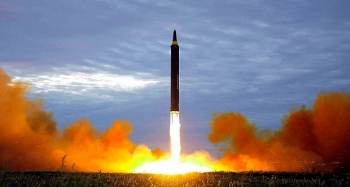 10 Mind - Blowing Facts About North Korea 10 Mind - Blowing Facts About North Korea Unlike South Korea, North Korea which is independent national economy is still mysterious to many people. 10 surprising facts about North Korea might wow you. |
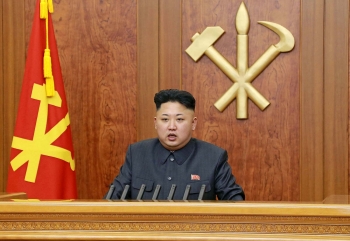 Who is Kim Jong Un: Biography, Education, Family and Path to Power Who is Kim Jong Un: Biography, Education, Family and Path to Power After his father's death, North Korean leader Kim Jong Un takes over his position so he assumes leadership very early. This article will provide you ... |
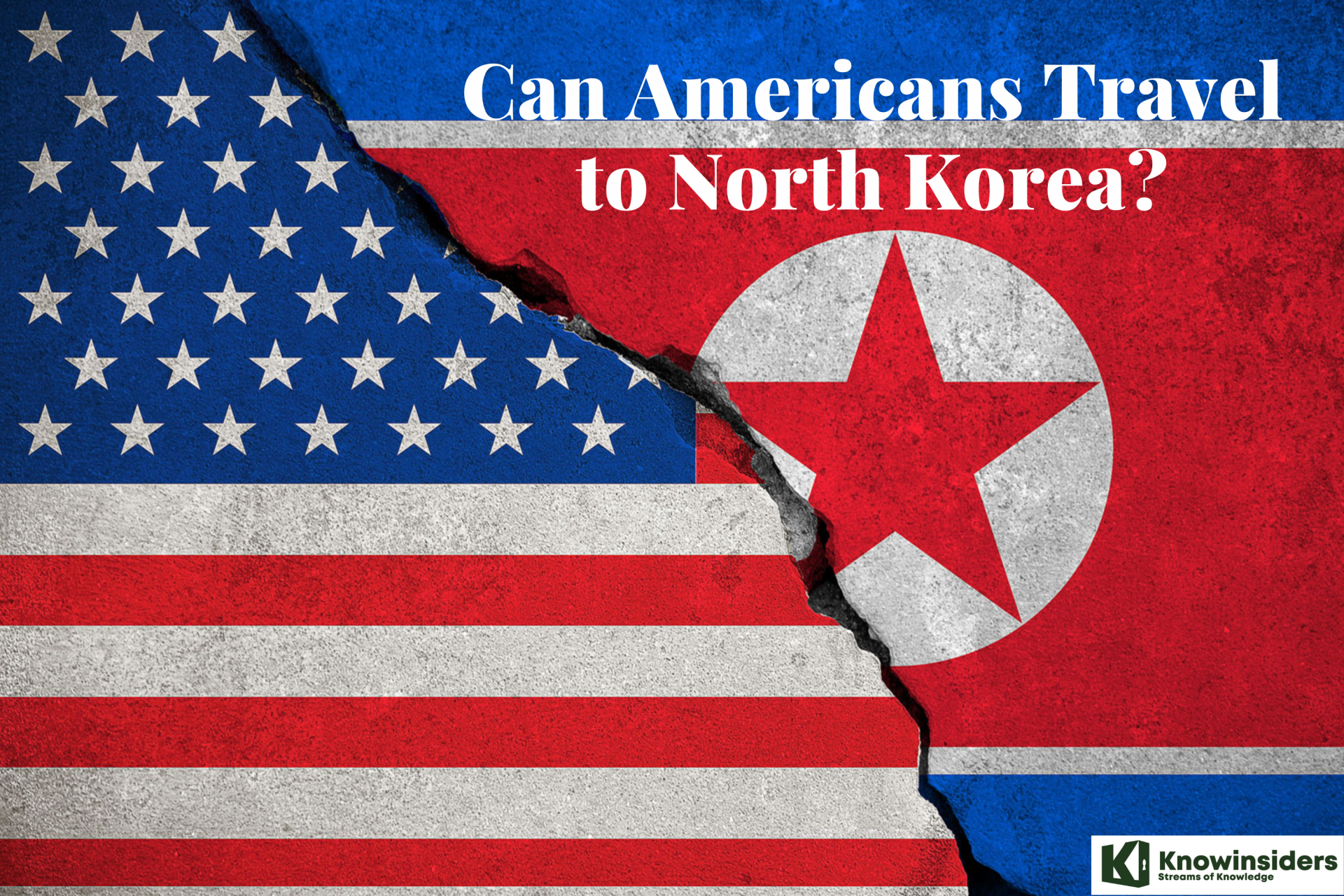 Can Americans Travel to North Korea? Can Americans Travel to North Korea? Can you travel to North Korea as Americans? Read on to know some rules and requirements for US citizens to travel to North Korea! |

